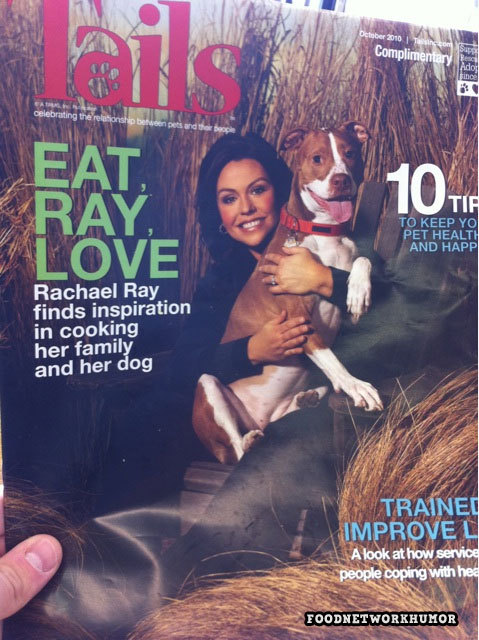First of all, I won't even touch on how stupid of a title "Eat, Ray, Love" is, but I will draw your attention to the caption. "Rachel Ray finds inspiration in cooking her family and her dog." Now, I'm not one to judge anyone's lifestyle or dietary choices but I think cooking her family and her dog might be a bit evil.
Oh, wait. Maybe that caption is just missing commas?
I looked at the cover again and added come commas to the caption. This changed it to "Rachel Ray finds inspiration in cooking, her family, and her dog." Ooh! This makes much more sense now (although I never liked Rachel Ray and I wouldn't put it past her to be a terrifying cannibalistic she-devil).
A panda walks into a café. He orders a sandwich, eats it, then draws a gun and fires two shots in the air.
“Why?” asks the confused waiter, as the panda makes towards the exit. The panda produces a badly punctuated wildlife manual and tosses it over his shoulder.
“I’m a panda,” he says at the door. “Look it up.”
The waiter turns to the relevant entry and, sure enough, finds an explanation.
“P a n d a. Large black-and-white bear-like mammal, native to China. Eats, shoots and leaves.”
“Why?” asks the confused waiter, as the panda makes towards the exit. The panda produces a badly punctuated wildlife manual and tosses it over his shoulder.
“I’m a panda,” he says at the door. “Look it up.”
The waiter turns to the relevant entry and, sure enough, finds an explanation.
“P a n d a. Large black-and-white bear-like mammal, native to China. Eats, shoots and leaves.”
A comma can completely change the meaning of a sentence. Truss uses religious texts as an example of how commas can completely change a meaning (and in religious texts, this is incredibly important).
"Comfort ye my people" vs "Comfort ye, my people"
According to Truss, the first one means "please go out and comfort my people" while the second option (with the comma), means "just cheer up, you lot; it might never happen."
So as you can see, something as small as a little comma packs a huge impact. Simply tossing one into a sentence can completely change the meaning. Let's take a look at my favorite example:
"Let's eat, Grandma!"
"Let's eat Grandma!"
The comma is a powerful and mighty instrument. It is the difference between comforting other people or someone else comforting you. But a missing comma is so much more than that-- it's violent. Rachel Ray eats her family and dog, pandas shoot waiters, and we eat our grandmas.
Punctuation saves lives.
Source:
Truss, Lynne. Eats, Shoots & Leaves. New York: Gotham, 2003. Print.
So as you can see, something as small as a little comma packs a huge impact. Simply tossing one into a sentence can completely change the meaning. Let's take a look at my favorite example:
"Let's eat, Grandma!"
"Let's eat Grandma!"
The comma is a powerful and mighty instrument. It is the difference between comforting other people or someone else comforting you. But a missing comma is so much more than that-- it's violent. Rachel Ray eats her family and dog, pandas shoot waiters, and we eat our grandmas.
Punctuation saves lives.
Source:
Truss, Lynne. Eats, Shoots & Leaves. New York: Gotham, 2003. Print.

No comments:
Post a Comment